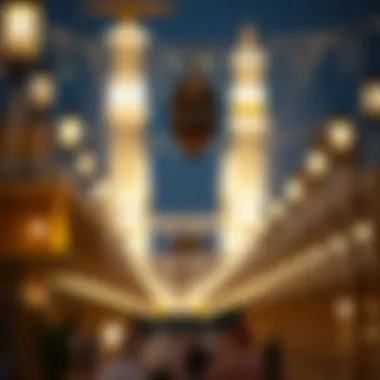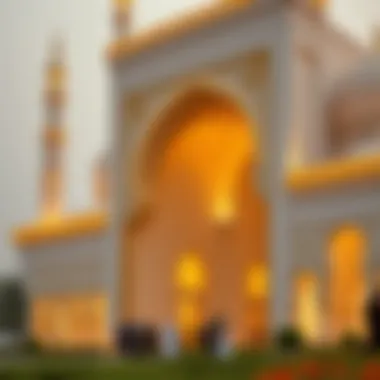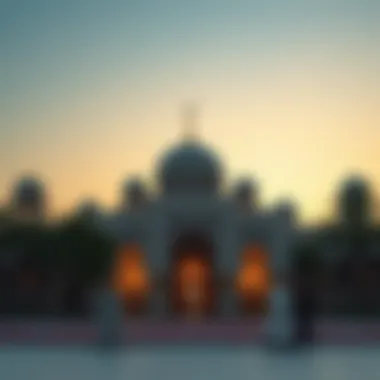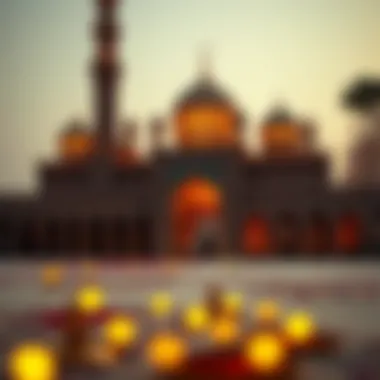Ramadan 2024: Cultural Impact and Observance in Dubai


Intro
Ramadan is not just another month on the Islamic calendar; it carries deep meanings and traditions that resonate with millions. In 2024, as the sun sets over Dubai and the call to prayer echoes in the air, the city will transform into a vibrant tapestry of faith, reflection, and community. While many focus on the spiritual aspect of fasting, the implications of Ramadan extend far beyond personal devotion. They profoundly affect the day-to-day lives of residents, the fabric of society, and even the economic landscape.
In this article, we’ll delve into how Ramadan shapes life in Dubai, touching on its cultural nuances, the impact on real estate trends, and the unique investment opportunities that arise during this holy month. Whether you are a resident hoping to understand the rhythms of your community better or an investor seeking to navigate the changing dynamics of the market, this guide aims to provide a comprehensive overview. Let's explore the significance and observance of Ramadan in Dubai—there's much more than meets the eye.
Understanding Ramadan
Ramadan is more than just a month of fasting; it's a profound spiritual journey that resonates deeply within Muslim communities around the globe, and particularly in cosmopolitan Dubai. This section seeks to shed light on what makes Ramadan significant, especially in the context of 2024 and its observance in a place carved by tradition and modernity. By delving into its definition, history, and cultural implications, we can appreciate how Ramadan shapes lives, influences economic activities, and fosters community bonds.
Definition of Ramadan
At its core, Ramadan is the ninth month of the Islamic lunar calendar, observed by millions of Muslims as a month of fasting, reflection, and prayer. The fast, known as sawm, is one of the Five Pillars of Islam, making it a fundamental aspect of the Muslim faith. Fasting lasts from dawn to sunset, where abstaining from food, drink, and other physical needs encourages believers to purify the soul, devote themselves to prayer, and focus on those less fortunate. This period is one of unity, as families and communities come together for iftar, breaking their fast at sunset. However, Ramadan is also a time for individual contemplation, spiritual growth, and increased devotion, shaping not just religious life but also everyday existence in Dubai.
Historical Context
Ramadan's roots can be traced back to the time of Prophet Muhammad in the early 7th century when it was revealed to him through the Qur'an. Historically, Ramadan was not only about fasting but was also a time of community gatherings and charitable acts. Fast forward to today, while the framework remains, the context has evolved. In a diverse city like Dubai, where cultures amalgamate, Ramadan takes on a multifaceted significance. It reflects a tapestry of traditions from various ethnic groups residing in the emirate, each contributing their own customs and rituals to the observance. This evolving history enriches the communal experience, fostering understanding among different cultural backgrounds.
Cultural Significance
In Dubai, Ramadan holds substantial cultural weight beyond religious observance. It serves as a catalyst for social cohesion, fortifying relationships within families and communities. The act of fasting invites empathy towards the less privileged, sparking a surge in charitable giving during the month. This sense of responsibility draws communities together—not just among Muslims but with those of other backgrounds who participate in local traditions or simply respect the observance.
As the sun sets, the ambiance transforms with vibrant iftar gatherings across the city. Restaurants and homes alike fill with the aroma of traditional dishes, ranging from dates to Harees, offering a feast that welcomes everyone at the table. Cities embrace this spirit; mosques become centers not only for prayer but for community engagement, where activities and charitable events flourish. For investors and local businesses, Ramadan also signals shifts in foot traffic and consumer behavior, making it vital to understand these patterns.
"In Dubai, Ramadan is not just a month of sacrifice; it's a season of giving, a time where compassion meets community spirit."
This cultural significance is especially important for investors, agents, and homebuyers looking to navigate the local landscape. Understanding Ramadan means acknowledging how it shapes daily life, market trends, and community interactions—an invaluable perspective for anyone engaging in Dubai's dynamic environment.
When is Ramadan in ?
The timing of Ramadan in 2024 is crucial for anyone looking to navigate Dubai’s cultural landscape during this month. This period is one of spiritual significance, where reflection, fasting, and community spirit come to the forefront. Understanding the dates of Ramadan can help investors and residents alike to seize opportunities and manage their commitments effectively.
Expected Start Date
In 2024, Ramadan is expected to begin on the evening of March 10. This date is calculated based on the lunar calendar, which is traditionally used to determine Islamic months. The sighting of the moon plays a pivotal role in confirming the start of Ramadan. As it approaches, local mosques and Islamic authorities will typically provide updates. This fosters a sense of anticipation and excitement among the community.
Expected End Date
Ramadan is anticipated to conclude on April 9, 2024. The end of Ramadan is marked by the celebration of Eid al-Fitr, a highlight in the Islamic calendar that brings families together. It signifies the end of a month of fasting and prayer and is celebrated with feasting and public festivities. Knowing this date is important for businesses and investors, as operations may shift significantly when festivities commence.


Variations in Dates
The actual commencement and conclusion of Ramadan can vary slightly based on moon sightings in different regions. In Dubai, local astronomical calculations typically align closely with global observations, but there may be differences.
"The beauty of Ramadan lies in its unpredictability, allowing for personal reflections and community unity."
Thus, for those living or working in Dubai, it’s wise to keep abreast of announcements made by authorities like the Emirates Islamic Affairs and Charitable Activities Department. Moreover, international citizens should be aware that differences in observance may occur depending on cultural practices or local interpretations in various parts of the Emirate or beyond.
Understanding these aspects grants a clearer perspective on how daily life, work, and community engagement will unfold during this month of profound significance.
Observing Ramadan in Dubai
In Dubai, observing Ramadan is not just a spiritual exercise; it’s a dynamic experience that intertwines with the fabric of daily life. The city, known for its rapid development and modern lifestyle, transforms during this month, reflecting deep cultural values and community spirit. This section aims to provide insights into how Ramadan is observed in Dubai, emphasizing its significance, practices, and community involvement.
Fasting Practices
Fasting during Ramadan is one of the Five Pillars of Islam, symbolizing devotion and discipline. In Dubai, individuals refrain from eating and drinking from dawn until sunset. This practice is not simply about abstaining from food; it's about attaining a higher sense of spirituality and empathy for the less fortunate.
Many residents start their day with a pre-dawn meal known as suhoor. This meal, often a healthy combination of complex carbohydrates and proteins, helps sustain them throughout the day. As the sun sets, the fast is broken with a meal called iftar. Traditionally, dates and water are consumed first, followed by a lavish feast that typically includes a blend of Middle Eastern and local cuisines.
While adults observe the fast, exceptions are made for children, the elderly, and those who are ill or traveling. The community's collective experience of fasting brings a unique sense of unity among residents, fostering a spirit of reflection and solidarity.
Iftar Traditions
Iftar is one of the most anticipated times during Ramadan, where families and friends gather to break their fast. In Dubai, iftar is celebrated in various forms, from intimate home meals to grand celebrations at restaurants and hotels. The spirit of generosity that defines this month is reflected in various iftar traditions throughout the city.
Many hotels offer spectacular iftar buffets, showcasing a myriad of dishes from different cultures, embracing the city’s cosmopolitan nature. From traditional harira to biryani, these meals are both rich in flavor and diversity. Additionally, several charities organize community iftars, promoting the notion of giving back during this month.
These gatherings are not merely about the food; they create opportunities for social interaction and community bonding, allowing individuals to connect with neighbors, colleagues, and sometimes even strangers, reinforcing social fabric.
Community Events
Community events during Ramadan play a central role in enhancing the observance of the month. In Dubai, various activities cater to different age groups and interests, promoting cultural awareness and community spirit.
These events can range from religious discussions and lectures held at mosques to cultural festivals featuring art exhibitions and performances. Streets are often alive with decorations, and many public places hold markets offering traditional crafts and foods.
In an effort to embrace the spirit of giving, initiatives like food drives and charity events are prevalent. They allow people to contribute to the well-being of others, resonating with the core principles of Ramadan.
"Ramadan is not just a month of fasting; it is a time to purify the soul, refocus attention on God, and practice self-discipline."


As the community comes together to observe Ramadan, it significantly impacts the social dynamics of Dubai, making it a month of connection, reflection, and spiritual growth. Understanding these observances enriches the overall experience of living or investing in Dubai, highlighting the importance of cultural integration in a global city.
Impact on Daily Life
Ramadan holds profound sway over daily life in Dubai, influencing various aspects of both personal and communal routines during this holy month. The changes that occur are not merely cosmetic; they deeply intertwine with the cultural and spiritual fabric of the society. For investors and residents alike, understanding these shifts is crucial, as they can significantly impact various facets of life.
Changes in Business Hours
As the sun begins to set, the rhythm of business in Dubai undergoes a notable transformation. Many establishments adjust their operating hours to accommodate fasting individuals. For instance, banks, retail outlets, and even governmental offices might shorten their schedules.
Typical changes include:
- Shifts in Opening Hours: Work hours often shift from 9 to 5, or even more condensed, to something like 10 to 3.
- Late Night Shopping: Many shops extend their hours into the late evening, catering specifically to those who are breaking their fast. You might find bustling malls from Iftar until the early hours.
These adjustments not only reflect respect for the spiritual significance of the month but also allow businesses to tap into increased consumer activity post-Iftar.
Social Interactions
The communal bonds are notably enriched during Ramadan, as folks find themselves gravitating towards shared meals and joint prayers. Initiations like group Iftars happen across the city as families and friends gather to break their fast together. This time of the year comes with its own set of social protocols, where sharing meals at lavish buffets isn’t just about food; it’s also about forging connections.
- Enhanced Community Spirit: Neighbors often visit one another, bringing dishes to share. This leads to a melting pot of culinary delights from different backgrounds.
- Charitable Activities: Many engage in acts of charity during this period, reinforcing social bonds. Distributing meals to those in need is seen as a noble act, deeply rooted in the teachings of Ramadan.
- Interactions in Public Spaces: Parks and communal areas become venues for gathering, as people enjoy the pleasant evenings. This increased foot traffic can also influence local business dynamics.
Tourism Considerations
For those in the hospitality and tourism sector, Ramadan brings both challenges and opportunities. While some foreigners may be unsure about visiting during this time due to fasting practices, others find it a unique aspect of their travel experience.
- Altered Tourist Attractions: Pyramid schemes of events might get altered during peak daytime hours. Popular attractions often feature 'Ramadan specials' at night, making it vital for travel operators to keep potential visitors informed.
- Cultural Experiences: Tourists can take part in iftar meals, exploring local dishes and customs, which adds to their travel narratives.
- Required Sensitivity: Tour operators should train their staff to understand cultural sensitivities. A vibrant mix of respect and celebration can greatly enhance the tourist's experience.
"Ramadan is a time for reflection, growth, and community. Recognizing its impact on daily life can help both residents and visitors navigate this enriching period more effectively." – Local Community Leader
Overall, the nuances of daily life during Ramadan in Dubai are shaped by this sacred month. Investors looking to capitalize on trends, as well as residents seeking a deeper understanding, must observe and appreciate the balance of commerce, social interaction, and cultural identity that unfolds every year."
Ramadan and Real Estate Market
Ramadan brings a unique rhythm to life in Dubai, and its effects extend into various sectors, including the real estate market. Understanding this influence is paramount for investors, agents, homebuyers, and property managers, as the holy month not only alters daily practices but also shapes monetary movements and investment strategies. For instance, Ramadan often creates a buzz in the community, leading to a surge in demand for certain property types while affecting pricing and leasing dynamics. It’s essential for stakeholders to grasp these nuances, ensuring they navigate this fluctuating landscape wisely.
Impact on Property Investments
When Ramadan rolls around, the sentiment often warms up. Investors tend to seek properties that are aligned with community values and cultural practices. Families looking to establish roots may prefer areas that offer easy access to mosques or local markets that cater to their needs during the fasting month. Beyond that, property developments that integrate communal spaces or are part of community-oriented projects can see an uptick in interest.


- Local Demand Growth: Developments close to recreational areas or places for community gatherings typically witness increased inquiry during Ramadan.
- Investor Strategy Shift: The month can lead investors to reassess their portfolios, focusing on properties that promise higher yields once the festive atmosphere ebbs.
Ramadan has a tendency to highlight the importance of blended living. Properties that marry comfort with a sense of community likely sparkle in the eyes of potential buyers.
Leasing Trends
The leasing market often shifts substantially during Ramadan. Short-term leases might flourish, especially in areas popular with expatriates or tourists. Many are drawn to Dubai’s vibrant atmosphere during this period, keen on experiencing the local culture firsthand. On the other side, landlords might find it challenging to attract long-term tenants during this month as many families might temporarily relocate for the fasting period or travel abroad for holidays.
- Increased Short-Term Rentals: Platforms like Airbnb see a spike as renters look for furnished apartments close to significant attractions or cultural sites.
- Rent Price Adjustments: Leasing rates might shift slightly as landlords become more amenable, wanting to fill vacancies while the market is slower.
The conditions set during Ramadan can facilitate new leasing agreements, reflecting the fluidity of the LGBTQ market.
Market Observations
Analyzing the real estate market during Ramadan reveals not just trends but also opportunities. Investors often need to take a colder look, studying supply and demand curves in relation to the month’s dynamic. It’s not merely a matter of observing transactions; rather, understanding the underlying desires of the community is crucial.
- Supply Considerations: Due to decreased construction and project launches during Ramadan, the market tends to stabilize in the near term, potentially driving up demand for available listings.
- Community Events Influence: Realty presentations and open houses during Ramadan may witness lower attendance, but this can be countered by hosting Iftar gatherings at open houses to engage family participation.
Highlighting the link between cultural observances and the real estate market offers a clear view of how the holy month intricately weaves into the fabric of Dubai's property landscape.
"Ramadan's impact on real estate encapsulates more than numbers; it reflects the pulse of the community and the rhythm of life."
For more insights about Ramadan in Dubai, you can refer to resources such as Britannica or community forums like Reddit.
Epilogue
As the month of Ramadan unfolds, it brings forth a tapestry of significance that resonates deeply within Dubai’s social and economic spheres. The observance of this sacred period is more than merely a time for fasting; it transforms the fabric of daily life, shaping everything from community interactions to property market trends.
Understanding the multifaceted implications of Ramadan is vital for investors, residents, and all stakeholders involved in the Dubai real estate market. This month fosters an environment of reflection, gratitude, and togetherness, can positively influence investments and leasing behaviors. During Ramadan, the nuances of social connections are heightened, inviting greater communal harmony that extends across diverse cultures residing in the emirate.
Importantly, businesses adjust their hours and offerings to accommodate those partaking in the fast, creating a unique economy rhythm that investors must navigate. For those attached to the local market, comprehending the patterns affected by Ramadan can present both challenges and opportunities.
Ramadan teaches patience and resilience—qualities that can translate into success in various pursuits, be it spiritual or financial.
In sum, this article provides a lens through which one can appreciate the extensive context of Ramadan in Dubai, intertwined with business cycles and community dynamics. By recognizing the significance of this holy month, stakeholders are better equipped to engage meaningfully with the rich tapestry of life unfolding during these vital 30 days.
Summary of Key Points
- Ramadan's Spiritual Essence: The month encapsulates deeper themes of reflection and community bonding, driving emotional connections.
- Economic Implications: Adjustments in business operations and societal interaction impact investment decisions in real estate and leasing trends.
- Cultural Harmony: The diverse populace of Dubai finds common ground during Ramadan, enhancing social cohesion which is crucial for stable communities.
Final Thoughts on Ramadan in Dubai
While the holy month breathes a unique vibrancy into everyday life, it also brings with it an opportunity for growth and understanding in a globalized city. For investors and residents alike, Ramadan serves as a reminder of the value found in relationships, both personal and professional. Embracing the spirit of this month can open doors to forging deeper connections and making informed decisions. As the sun sets and iftar gatherings commence, so too do the possibilities of engagement in Dubai become richer. For those watching the market or partaking in the community, the lessons of Ramadan serve as a guiding light toward a harmonious existence in a bustling urban landscape.
For further information on Ramadan and its significance, check out resources from Wikipedia and Britannica.







